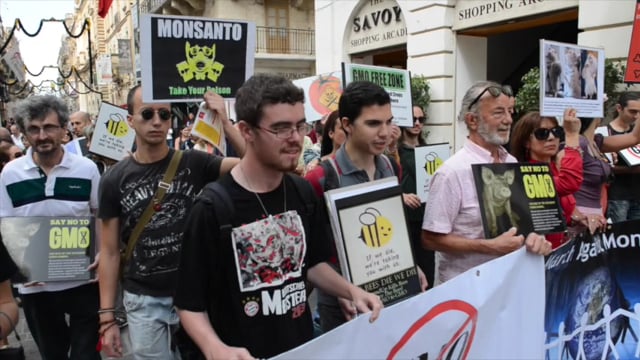[WATCH] Government urged to ban pesticides from public spaces
Around 60 people attend protest march in Valletta against Monsanto, GMOs and pesticides.



The Clean Food Movement has called on the government to ban pesticides from public spaces, residential zones, and both public and private gardens.
“The World Health Organisation has recently categorized the leading global pesticide glyphosate as probably carcinogenic,” movement activist John Portelli said, while citing a urine sample test by Friends of the Earth Europe in which 90% of Maltese participants tested positive.
He was speaking during a protest march in Valletta to condemn the agribusiness giant Monsanto, as part of the third annual worldwide ‘March Against Monsanto’, organized by the Clean Food Movement, a front of 21 NGOs including the Gaia Foundation, BirdLife and Friends of the Earth Malta.
Around 60 people attended the protest march
Portelli warned that six local councils- Naxxar, Zejtun, Marsascala, Floriana, Balzan and Kalkara- have admitted using pesticides to treat plants in public spaces. 19 local councils denied doing so, while the remaining 43 chose not to respond after “two weeks of pressure by the movement”.
He pointed out that Malta does not have an accredited laboratory that can carry out food tests for chemical residues and genetically modified organisms (GMOs) that can be used as evidence in court.
“Since all tests have to be assigned to a foreign laboratory, this is creating an unwarranted latency in the food control system encouraging abuse by some unscrupulous producers and processors,” Portelli said. “It is evident that the authorities are also lacking an efficient and effective enforcement structure to guarantee the continuous safety of the food we consume.”
They warned that Monsanto's Round-Up weedkiller contains glyphosate, that the US-government-run Food and Drugs Administration is led by ex-Monsanto executives, and that Monsanto's GM seeds have contributed to the decline in the world's bee population. Despite this, the U.S. Congress has banned courts from halting the sale of Monsanto's GM seeds.
The movement is calling on people to eat organic food, to avoid junk food and processed food containing GMOs, and to spread awareness on Monsanto's "secrets".
In a response to the worldwide protest day, Monsanto spoke of their pride to collaborate with farmers and partnering organisations “that help make a more balanced meal accessible for everyone”.
“Our goal is to help farmers do this in a more sustainable way using fewer resources and having a smaller impact on the environment.,” Monsanto said in a statement. “The 22,000 people of Monsanto are committed to having an open dialogue about food and agriculture. We know people have different points of view on these topics, and it’s important that they’re able to express and share them.”


.png)




















